Confidential presidential search raises concerns on campus
◊ ISA HUDZIAK EDITOR-IN-CHIEF
◊ HOLLIE DAVID MANAGING EDITOR
The Utica University section of the American Association of University Professors, otherwise known as AAUP-UC or the Faculty Union on campus, has expressed concerns via a public letter about the recently announced confidential presidential search.

The Board of Trustees has responded with an explanation as to why they decided to host a confidential search for the next president of the university.
AAUP-UC, which promotes shared governance and transparency, maintains that the search for the next university president should be an open one for all members of the campus community.

“Utica University has always had a history of shared governance. A confidential search flies in the face of shared governance and signals that the Board of Trustees does not deem it necessary to involve the campus community in any meaningful way,” AAUPUC President Leonore
Fleming said. “This is not just a faculty issue, but an issue that impacts the entire campus community. Transparency and shared governance are necessary for this institution to thrive.” Several pieces of correspondence were shared since an announcement update was made on Oct. 7.
October 7: Campuswide Presidential Search update
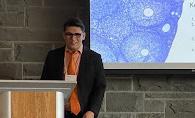

The concerns arose from an update emailed to the student body and posted to the presidential search page on Oct. 7, which announced that the institution has chosen RH Perry & Associates Inc. to lead the presidential search.
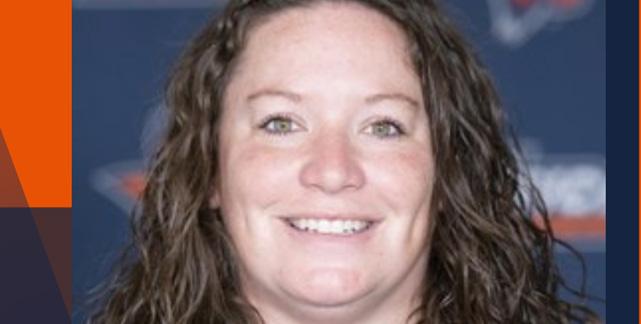
According to the announcement from Heidi Hoeller ‘91, the chairperson of the presidential search committee, RH Perry suggested a confidential search due to the different climate of today’s hiring environment hosting a confidential search could potentially expand the options the University would have for a new president.
“Search firms, including RH Perry, recommended the committee undertake a “confidential search” process to potentially broaden the prospective pool of qualified candidates,” the announcement said. “A confidential search means the candidates
are not introduced to the University community until a president is announced.”
According to Robert Brvenik ‘77, the chairman of the Board of Trustees, running a confidential search increases the quality of the candidate pool.
“By running a confidential search you have a better chance of getting sitting presidents, provosts, maybe strong deans and so forth to do it,” Brvenik said.
Brvenik went on to explain that while there was debate within the board, one goal stood out to sway them.
“We feel it is most important that you have the best potential candidates for the job,” Brvenik said.
October 16: Faculty Union response
The AAUP-UC sent a public letter to the Board of Trustees on Sunday, Oct. 16 expressing concerns about the campus’s confidential presidential search.
“AAUP policy statements make clear that such decisions to forgo public continues on page 4
VOL. LXXVI, ISSUE 4 FRIDAY, OCTOBER 21, 2022 UTICATANGERINE.COM The LSAMP program NEWS | PG. 6 Career Closet FEATURES | PG. 9 Softballl profile: Rinae Olsen SPORTS| PG. 12
TANGERINE
Photo of chairs and an empity stairway in the Wilcox Science Center /Photo: Alexandria Leland
Fall 2022 STAFF
@UticaTangerine
@Utica_Tangerine
@Utica_Tangerine
Editor-In-Chief - Isa Hudziak
Managing Editor - Hollie David
Features Editor - Mickale Thompson
Sports Editor - Kaitlyn Renwick
Photographer - Alexandria Leland
Tangerine Clerk - Charles Buckley
Social Media Manager - Nicolas Leonard



Adviser - Mary Christopher
Interm Adviser - Megan Postol
Lord President Nolan
Submission Policy
Letters to the editor are welcomed from all members of the Utica University community. Letters must meet fair and accurate publishing standards and contain no libelous material. Anonymous letters to the editor will not be printed. All letters and editorials must meet the print deadline of 5 p.m. on Mondays. Please send all submissions to tanger@utica.edu. Takeback requests are a form of censorship and therefore not accepted.
Advertising Information
The Tangerine accepts paid advertisements. Advertising copy is subject to the same professional publishing standards as content. The Tangerine reserves the right to reject advertising that does not meet the standards established, is libelous, is in poor taste or violates discrimination laws. Please direct all inquiries to tanger@utica.edu. The deadline for publication is 10 a.m. on Tuesdays.
The opinions and columns expressed in The Tangerine are those of the individual writers and do not represent the views of The Tangerine or Utica University.

News Tips? Opinions? Contact The Tangerine! TANGER@UTICA.EDU

PAGE 2 FRIDAY, OCTOBER 21, 2022 UTICATANGERINE.COM
Tangerine is published biweekly during the academic year by and for Utica University students. To reach a member of the staff, email tanger@utica.edu or call 315-792-3065. All material printed
The Tangerine is copyrighted. The Tangerine was first published
the
Nov.
1946.
STAFF About The
in
as
Utica College News on
6,
Rotary Club of Utica offering students paid internships
◊ BRADY BARNARD
CONTRIBUTING WRITER
Paid internships are being offered to Utica University students by the Rotary Club of Utica. Applications are being accepted now for the spring and fall academic semesters of 2023.

Through paid internships with local organizations such as the Rotary Club, students will be able to exercise their knowledge in a professional setting while gaining experience.
The goal of the Rotary Club is to provide individuals with the opportunity to
make a positive impact on others lives by serving the community and promoting high ethical standards.
According to the President of The Rotary Club Tina Pavlot, the Rotary Club of Utica pledged to serve in the best traditions of Rotary— providing its members with opportunities for fellowship, network and participation in community service projects.
“Through our committees we offer Youth Exchange and Internship programs, Community Recognition Award programs, and volunteer opportunities through our Social Justice
and Urban Concerns efforts.” Pavlot said.
The Rotary Club is a civic organization built on the principles of connection and service to the community.
“We believe the ideas of Rotary founded on friendship and service above self are as important today as ever before, and they require the involvement of individuals committed to the betterment of each other and the community,” Pavlot said. “
The Internship is an opportunity for students not only because it will provide
experience and knowledge, but businesses in the area will be able to evaluate the work done during the internship, which can lead to possible job opportunities in the future. The internship also comes with the additional benefit of being paid for your work.
The internship application can be found on the Utica Rotary’s website, uticarotary.org. Students that are interested in taking advantage of this opportunity, applications must be submitted electronically by November 1, 2022.
Campus safety Blotter

PAGE 3 FRIDAY, OCTOBER 21, 2022 UTICATANGERINE.COM Date Of Incident Time Of Incident Short Description Building 10/6/2022 8:00 AM Academic and professional misconduct Addison Miller White Hall 10/7/2022 12:20 PM Medical Assist Moses G. Hubbard Hall 10/7/2022 9:20 PM Fire Alarm Pioneer Village 10/7/2022 1:50 PM Medical Assist Unknown/Other 10/8/2022 6:40 PM Motor Vehicle Pioneer Village 10/9/2022 9:50 AM Fire Alarm Pioneer Village 10/10/2022 5:45 PM Fire Alarm Pioneer Village 10/10/2022 9:25 PM Sprinkler Alarm Pioneer Village 10/11/2022 5:35 PM Harassment Tower Hall 10/12/2022 8:25 PM Petit Larceny Unknown/Other 10/13/2022 8:00 AM Moving Violation Roadway 10/13/2022 4:00 PM Misuse of Keys North Hall 10/14/2022 10:45 PM Alcohol Violation North Hall 10/14/2022 11:30 PM Alcohol Violation Pioneer Village 10/15/2022 10:35 PM Student of Concern South Hall 10/16/2022 2:05 AM Moving Violation Roadway 10/16/2022 1:10 AM Moving Violation Harold T. Clark, Jr. Athletic Center 10/16/2022 8:30 PM Vandalism South Hall 10/18/2022 11:30 AM Property Damage Pioneer Village
NEWS
continued from page 1 campus visits and public forums by finalists violate long standing principles of shared governance,” the AAUP Statement on Presidential Searches said. “Shared governance helps ensure that universities and colleges serve the public interest.”
This letter, sent to the Board of Trustees by AAUP-UC president Leonore Fleming, further explained the importance of an open and transparent search process by bringing up a key point in the AAUP guide.
“...open visits are crucial in the success of the search process because they permit members of the campus community to participate in providing impressions, as well as to contribute to the candidate’s understanding of the culture of the institution,” the AAUP guide said.
This guideline led the AAUPUC to pose the following question in their letter, “Given the importance of transparency and shared governance on this campus, is a confidential search the best way to attract those candidates who would be a “good fit” for Utica University and who can understand and appreciate our campus culture?”
Overall goals of having an open and transparent search stem from wanting the selected applicants to have full understanding of what students, faculty and staff on campus need in a new president, Fleming said.
Douglas Edwards, professor of philosophy and vice president of the AAUP-UC, shared a similar sentiment.
“Excluding the campus community from meeting candidates is bad for
both the University and the potential candidates: we on campus do not get the opportunity to meet the candidates and get a sense of their priorities, and candidates are unable to get a proper sense of the institution to help them figure out if we are a good fit for them,” Edwards said. “We have had such a push to return to in-person learning after the pandemic because of the significance of face-to-face interactions, and it is unfortunate that the Board of Trustees has chosen to do something completely counter to this in such an important case by preventing face-toface interactions between presidential candidates and the campus community.”
Attached in the letter were also several sources of past colleges and universities using confidential search tools which then led to negative results.
An article titled “The Cost of Closed Searches” by the AAUP explores several instances where presidents have been elected confidentially and due to this, important information which would have prevented them from receiving the role were never brought to light.
“Secrecy deprives university search committees of the benefit of information— including disqualifying information—that might be volunteered if finalists’ names were publicly known,” the article said. These issues included monetary and discriminatory problems that campuses were unaware their new presidents had due to closed searches according to the article.
October 19: Response from Board of Trustees

The Board of Trustees sent
a response to the AAUP-UC the morning of Wednesday, Oct. 19. The letter said that the decision to use a confidential search was deliberated in length by the Board.
“The decision was not made lightly by the Board, but rather after careful consideration of the advantages and disadvantages, perspectives from search firms, and observation of the practice of our peer institutions,” the letter signed by Brvenik said.
In addressing the concern of transparency in the presidential search, the letter suggested that having a confidential search allows more transparency than a closed search, despite not being as transparent as a completely open search.
According to Brvenik, an open search would entail the public being made aware of finalist applicants after they are selected by a committee. This would be followed by an open forum hosted on campus where constituents are able to meet and speak with them. A closed search would be conducted privately by a committee, who would gather candidates and information to present to the Board of Trustees with two to four finalists. The Board would then select the new president and announce to campus their decision.
With a confidential approach, the search firm conducts forums on campus allowing constituents to give input on the qualities for potential candidates. The firm will then gather candidates, the presidential search committee will interview the candidates to determine two to four finalists and then an assembled feedback committee will review the finalists. They will then
present pros and cons of each candidate to the Board of Trustees who will make the final decision.
A campus wide survey was made available the same day to allow for a wider pool of feedback from the community and those who were unable to attend the forums held by RH Perry.
“Although this is not the open search you are advocating for, this hybrid method is more transparent than a search that is completely closed,” the response said.


October 19: Faculty Senate resolution
Later in the afternoon, the Faculty Senate held an emergency meeting to discuss the response among other pressing concerns surrounding the presidential search. During this meeting, the Senate voted unanimously on a resolution that the response was inadequate.
“The Utica University Faculty Senate endorses the October 16, 2022 AAUP-UC Open Letter to the Chairperson of the Presidential Search Committee,” the resolution said. “The response by the Chairperson of the Board of Trustees dated October 19, 2022, does not adequately address the concerns raised by the AAUP-UC.”
Updates will follow as soon as they become available.
UTICATANGERINE.COM
PAGE 4 FRIDAY, OCTOBER 21, 2022
NEWS
New Flex Work Program will reduce the work hours of full-time staff members
◊ MICKALE THOMPSON FEATURES EDITOR
Utica University recently, with an announcement from President Laura Casamento, launched a new program that will reduce full-time staff work hours from 37.5 to 32 hours.



The announcement came on the back of a challenging past two years due to the pandemic.
Time flexibility is a main topic among faculty and staff. Throughout the pandemic, the institution has pivoted to put plans in place to work together to create opportunities that aid in a better work-life balance while also still satisfying the needs of the community. This new innovation is called The Flex Work Program.
According to President Casamento, flex work is an alternative to the university’s standard administrative staff work week. It will in essence reduce the standard work week for full-time staff employees. Employees will be paid their current full-time salary and receive the same allotment of paid vacation days, holiday time and sick days.
A four day work week is an initiative that would give employees the opportunity to have one day of the week free from work. Flex work provides an alternative to that by offering more flexibility.
“Our program offers greater flexibility and scheduling,” Casamento said. “We recognize that not every office and administrative department operates in the same way. Flex work allows each of them to develop a plan that fits both the goals of the office and the needs of those who work there.”
Director of Campus Engagement Lauryn Moore is tasked with leading a team on the campus engagement side of the Student Living
and Campus Engagement office. Moore along with her team oversees all the clubs and organization functions, student government, greek life, leadership development, UCPB and the Student Center Lounge/Bubble on campus.
Moore believes that this new initiative is an exciting and real progressive move on behalf of leadership.
“I think this is a really progressive idea. I think that we are so stuck in the “40-hour, 9-5, work week” mindset in America and I think a lot of businesses are starting to re-shift their thinking on what a work week could look like,” Moore said. “Personally, for me, I love my job but I also love my family, and sometimes I feel there are not enough hours in the day to be good at both. Now, I feel like I can get more time with my son, and that is priceless to me.”
The new program will not only benefit the work experience of employees but will also improve the experience of the students also because staff will be able to flex their hours so students will be able to get the help they need at times when the office is originally closed.
“For the Campus Engagement team, we now get to look at other ways to serve our students in creative ways, because we know that we don’t have the same hours as you all,” Moore said. “This allows us to work with the schedules of students to provide more support that
they might need later in the day.”
The Administrative Staff has what is called the Professional Staff Advisory Council (PSAC) with votedin positions and committees through which they can bring ideas to leadership. The Flex Work Program some believe will boost morale in the workplace and also personally because employees will feel more refreshed allowing students again to get the full experience.
“I think the PSAC committee and President Casamento have worked together to identify alternative ideas that would work best for everyone on campus. I was personally never expecting to go to a 32-hour work week every week, it was a huge surprise, and I’m excited about it,” Moore said. “When we are our best selves, that’s when we give the students our best selves. If I have a day where I’m feeling rested, and I’m not focused on all the other things I have to do at home, when I’m here I’m fully focused on my job here.”
According to the Director of Student Living Marissa Hall, this new plan is a great step forward as there have been companies across the world that have done a similar strategy and it has shown to be super beneficial. Creating the flex work program instead of a strict “4 days on 1 day off” policy allows each office and each employee the flexibility to choose what is best for them.
Hall also believes that this is a great opportunity and incentive for employees looking to get work opportunities in higher education.
“When looking for any place of employment, each individual candidate has a list of things they are looking for in a job and in a place of employment,” Hall said. “ I think this is definitely something that is going to be a great offering that will certainly check some boxes on this list of things people are looking for.”
The program allows employees to be more flexible. Employees will have the opportunity to work four eight-hour days with one day off. Others who may have younger children can work shorter days to have more flexibility. Offices with various workloads can also bank their flex hours and use them in other instances.
However, as long as families and students continue to have full access to services. Casamento believes that this will produce and provide a high standard of student service that Utica is known for.
“I directed human resources to meet with each vice president and their department heads to work through the details of how flex work will be implemented, “ Casamento said. “These meetings over the next couple of months with the goal of initiating a trial of this program on January 1. We will test the program for one year with assessment points along the way. Our expectation based on our study of other organizations is that this will greatly help Utica University employees while positively impacting productivity. I am confident that if we work together in a thoughtful and cooperative way, we’ll achieve the same goal.”
PAGE 5 FRIDAY, OCTOBER 21, 2022 UTICATANGERINE.COM NEWS
/Photo: Utica University website, utica.edu.
Utica University offers LSAMP program to students
◊ ISA HUDZIAK EDITOR-IN-CHIEF
Utica University is one of seven schools currently part of the Central New York Louis Stokes Alliance for Minority Participation program, otherwise known as CNYLA, which is a coalition that aims to increase diversity in Science, Technology, Engineering, and Mathematics (STEM) fields.
What is LSAMP?
The Louis Stokes Alliance for Minority Participation (LSAMP) is funded by the National Science Foundation (NSF) and was named in honor of former congressman Louis Stokes, who advocated for civil rights and became the first Black congressman elected in the state of Ohio.
The LSAMP section is housed under Diversity, Equity, and Inclusion & Student Transitions. The faculty coordinators are Professor of Biology Sara Scanga, Professor of Biology Jessica Thomas and Associate Professor of Chemistry Alyssa Thomas.
According to the LSAMP page of the Utica website, the goal of LSAMP is to assist universities and colleges in diversifying the STEM workforce by increasing the number of degrees, both baccalaureate and graduate, awarded to historically underrepresented populations, which include African Americans, Hispanic Americans, American Indians, Alaska Natives, Native Hawaiians, and Native Pacific Islanders. Students are eligible for LSAMP if they are a U.S. citizen or Permanent Resident, part of an underrepresented minority as described by LSAMP guidelines and are pursuing a bachelor’s degree in one of the following majors:
biology, chemistry, computer science, cybersecurity, math, physics and more.
“The LSAMP Scholars program aims to lessen the financial barrier to conducting research during undergraduate education, helping increase persistence to graduation for our underrepresented students and better prepare them for the demands of the STEM field,” said Kira Maddox, communications and community engagement coordinator in the Division of Diversity, Equity, and Inclusion & Student Transitions.
Anthony Baird, the vice president for Diversity, Equity, and Inclusion & Student Transitions, said that Utica is showing a commitment to fostering the same goal as the NSF by introducing incoming eligible students to the program and reaching out to returning students regarding the program as well.
“Students are passively aware of the importance of the diversification of the STEM field,” Baird said. “We are in our early stages of coordinating our efforts on campus to ensure more students are aware of this opportunity. We are committed to creating a program and a community that supports any of the students who fit the criteria for the LSAMP program— one that ensures they are encouraged and engaged in efforts so that they can thrive successfully in the STEM workforce.”
What does LSAMP offer to students?
As a member of the LSAMP program, students are eligible to receive a $4,000 research stipend, faculty mentorship and additional networking opportunities through the alliance.
“Networking is one of the
greatest keys to success in the professional world,” said Kailea Murray, the director of the Jeremy C. Thurston ’00 Center for Career Readiness. “Having a professional network allows you access to informational interviewing, job shadowing, and can even lead to internship and career opportunities. It is critical to understand the industry and/or field that you will be entering, and leveraging your network allows you to ask questions to gain a sense of familiarity or an insider’s view.”
According to the faculty advisors, having an initiative that supports independent research projects is integral to the success of students.
“There is research that indicates that students from underrepresented groups in the sciences tend to stay in their major and graduate when they have gotten involved in research early on,” Scanga said.
Having a faculty mentor and access to research labs can help students practice their skills.
“[Independent research] can help to learn and reinforce knowledge, critical thinking and analytical skills
that students work towards in their curriculum,” Jessica Thomas said.
One of the first students brought into the program was Nathan Rice, a junior biology major with a minor in healthcare ethics, who has attended conferences as part of LSAMP. The most recent was the 2022 Central NY LSAMP Symposium at Ithaca College on Sept. 17. At Utica, Rice has been working on a project with professors Adam Pack, Terri Provost and Sarah Keesom regarding the ovarian follicle development of mice and how social isolation can cause an impact.
Over the summer, Rice attended the Weill Cornell/ Rockefeller/Sloan-Kettering Gateways to The Laboratory Summer Program where he was able to participate in research at the Memorial Sloan Kettering Cancer Center.
While attending the symposium, Rice presented his most recent findings about both research projects and was able to meet students and administrators from different schools.
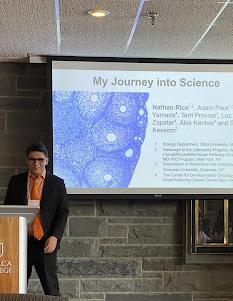
“It has been an incredible experience to do student research and to be part of LSAMP,” Rice said. “I encourage students who want to do the same and build lasting connections to go for it.”
What should students do if they’re interested?
If a student wants to learn more about the program, they can reach out to the faculty advisors: Sara Scanga (sescanga@ utica.edu), Alyssa Thomas (acthomas@utica.edu) or Jessica Thomas (jhthomas@ utica.edu). Further questions can be directed to the Division of Diversity, Equity, and Inclusion.


PAGE 6 FRIDAY, OCTOBER 21, 2022 UTICATANGERINE.COM
Nathan Rice presenting at the 2022 Central NY LSAMP Symposium at Ithaca College on September 17.
/Photo: Kira Maddox
NEWS
Utica University’s four-year graduation guarantee
◊ HOLLIE DAVID MANAGING EDITOR
Last year Utica University implemented the four-year graduation guarantee for undergraduate students on campus.
The goal of the graduation guarantee is to help all incoming full-time first-year students, starting from Fall 2021, to complete their bachelor’s degree in four years and to reduce the overall cost students are spending on tuition.
Director of Student Success Bethany Samuels, along with Senior Vice President for Student Life and Enrollment Management Dr. Jeffery Gates, both of Utica University, explained in an email why the guarantee was created.
“Utica University is committed to College and University Affordability,” Samuels and Gates said. “This overarching commitment is what inspired the guarantee. We started with offering all new students a $10,000 Affordability Grant in 2015, then reduced the cost of tuition and fees by 42% and housing by 13% the following year.”
They went on to explain how these past
implementations have affected the university.
“These efforts have allowed more high school and transfer students the ability to enjoy a highly personalized private higher education experience,” Samuels and Gates said.
“Further, we’ve been able to reduce the debt of our graduates by more than 33% since our tuition reset.”
Students are first informed of the four-year graduation guarantee during the admissions process and are required to then sign an agreement that outlines the details which go along with the guarantee, explained Samuels.
Each student is assigned a success coach by the Center for Student Success at the beginning of their college journey, which is designed to help a student do all they need to to remain on track.
Utica’s website outlines the various steps that students need to take to ensure they graduate on time through the four-year guarantee, which students will work with the center for student success and their specific success coach to complete.


These steps include keeping appointments
made with your success coach, passing all classes with program-specific grades and paying all required tuition and fees. By not following these steps, the guarantee can then be voided through the university.
Along with the student promises, according to the Utica website, the university will work with students to keep them on track and ensure they graduate on time. They also explain that any student who will not graduate on time will have the university work with them to ensure degree completion.

“If you have met your
responsibilities and are not able to graduate in four years, provide you the opportunity to complete any courses required for your degree, free of any tuition and fee charges,” the university’s website said. The guarantee has created a deeper sense of accountability for students and advisors, Samuels explained. It has helped to emphasize the overall importance of taking the correct courses and completing students’ degrees on time.
“[We want] to see as many students as possible cross the stage in four years and shake the President’s hand,” Samuels and Gates said.
Student on the Street How do YOU feel about the four-year guarantee?
“A
“I think it will work as it helps reduce the stress on students for cost and financials.”
-Jacob Carissimo, English Education major
PAGE 7 FRIDAY, OCTOBER 21, 2022 UTICATANGERINE.COM
Running Man on campus. /Photo: Alexandria Leland
NEWS
“I think people would definitely still take more than 4 years. It’s a matter of discipline and mental health.”
-Adam Liebers, Physics major
“I think conceptually it is a good concept. However, applying it and working for it is the important part.”
-Patrick Hampe, Criminal Justice major
lot of people need more than the 4 years. My success coach at utica has changed every year, and my financial advisor has also changed. So I can imagine that for less strict majors it’s even more confusing to know requirements for graduating.”
-Jordyn Bucci-Mooney, Physical Therapy major
Quotes gathered by Charles Buckley, Tangerine Clerk
Commencement speaker announced for the class of 2023
◊ ISA HUDZIAK EDITOR-IN-CHIEF

Greg Sankey, the commissioner of the Southeastern Conference (SEC), was announced as Utica University’s commencement speaker on Monday, Oct. 10.
Sankey’s career roots back to the former Utica College from 1987 to 1989, where he assumed the role of director of intramural sports. He then transitioned to oversee athletic compliance at Northwestern State University and the Southland Conference before becoming commissioner of the Southland Conference in 1996.
According to the SEC website, Sankey was inducted as the eighth commissioner of the Southeastern Conference
on June 1, 2015. He first joined the SEC staff in 2002 as an associate commissioner for governance, enforcement and compliance and later worked his way up to his current position of commissioner.
During his time as commissioner of the SEC, which is a 14-member Division 1 athletic conference, Sankey has been an advocate for student-athletes.
“Educating scholars and supporting champions provides the platform for developing leaders who will influence the world,” Sankey said during his first address as commissioner of the SEC in 2015.
Sankey created a framework for providing young athletes in the Conference with leadership opportunities
and resources that are challenging and provide increased levels of academic and competitive success.
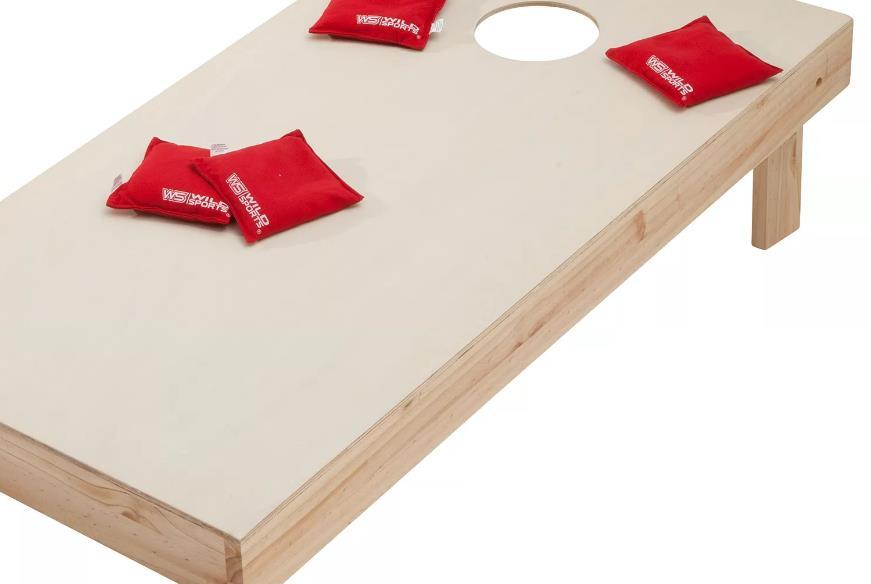
“We are privileged to welcome Greg Sankey back to Utica,” Utica University President Laura Casamento said in the announcement. “Less known but equally





impressive at the remarkable details of his journey from a firstgeneration college student to one of the most powerful figures in sports.”
Undergraduate Commencement will be held on Thursday, May 11. More information will be available closer to the date.
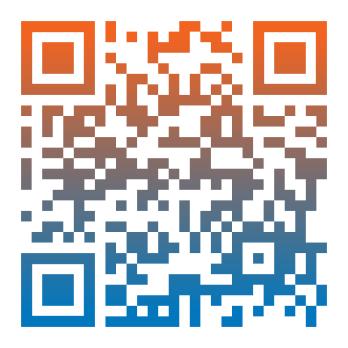
PAGE 8 FRIDAY, OCTOBER
UTICATANGERINE.COM
21, 2022
NEWS
Free Pizza, & Networking with Business School Professors! Thurston Auditorium in Construction Management Building on campus Wednesday, October 26th 3:00-5:00pm Pre-Register Yourself and/or Your Team of 2 • Event & Tourney Open to Utica Business Students. • Single elimination Prizes for 1st & 2nd Place Teams. • 2 Players/Team • No team, no problem. We’ll assign you to a team.
Photo of Greg Sankey. /Photo: From utica.edu
Cornhole Fall Tourney
Career Closet: professional clothes for all
◊ KAYDEN LAMPHERE CONTRIBUTING WRITER
The start of a new semester at Utica University brought various opportunities for students to expand their resumes with different job opportunities. However, many students find themselves unable to purchase professional attire to attend job interviews or career fairs. This makes it difficult for students to network in the professional world .
The new Career Closet, opened by the Center for Career Readiness on October 3, aims to fix that for students on campus. This provides a chance for students to use this resource to create a professional look at no cost.
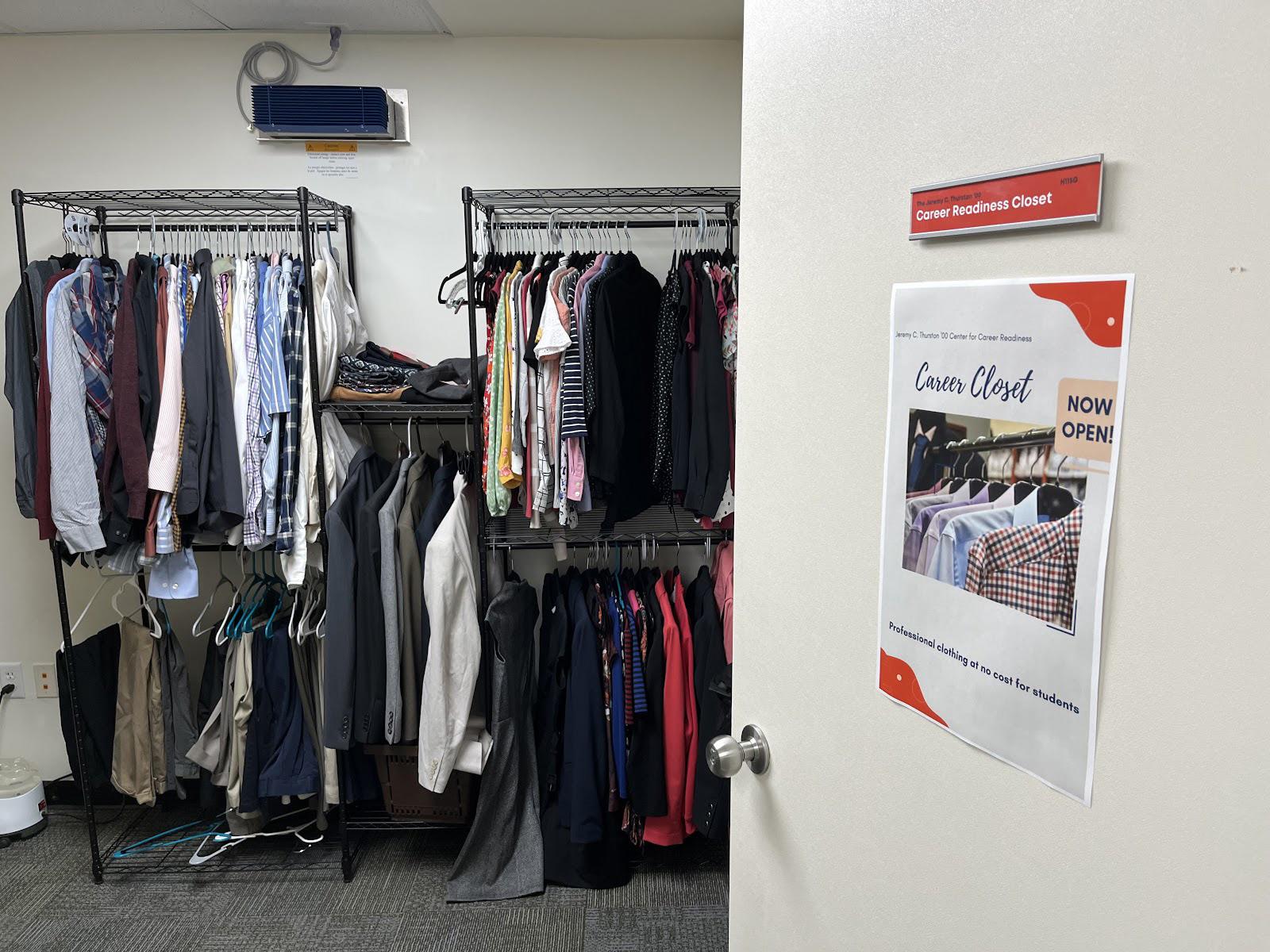


“The Career Closet was bred from an idea of providing equity and access to our student population,” Associate Director for Student
Transactions Jennifer Rubino said. “We know that if someone doesn’t feel comfortable or feel like they have the appropriate dress to step up and attend a networking opportunity, or

seek out an interview for a position, then they’re not going to go through with that if they don’t have access to the appropriate clothes.”
The closet offers students a wide selection of different professional clothing. Students can get clothing items such as full suits, dress pants, dress shirts, blazers, dresses, blouses, ties, belts and socks.
“Students are able to keep clothing, once they have it, it’s theirs,” Career Coach Alexis Racioppa
said. “If at any point they would like to donate it back, that’s just fine. But, students are given the clothing with the understanding that it’s theirs forever.”
The closet is donation based which means anyone can donate any professional clothing item they want. This will hopefully encourage the community to collaborate with the Career Center.
“We’ve received a lot of donations from faculty and staff, and we are also accepting donations from
students if they have things that they either don’t want or don’t fit anymore,” Racioppa said. “It’s for everyone, and from everyone.”
According to the Director of the Jeremy C. Thurston ’00 Center for Career Readiness Kaliea Murray, the goal of the Career Closet is to prepare students for their careers and eliminate barriers, such as purchasing clothing. Murray encourages students to take advantage of these resources and let others know because anyone can utilize it.
The Career Closet is open Mondays through Fridays, 8:30 a.m. to 5:00 p.m., at the same time as the Career Center is. Appointments can either be made on Handshake, or via walk-in, to access the closet. For more information, email Kaliea Murray (kemurray1@utica. edu), Alexis Racioppa (acraciop@utica.edu) or stop by the Center for Career Readiness in Hubbard 115.
PAGE 9 FRIDAY, OCTOBER 21, 2022 UTICATANGERINE.COM FEATURES
The inside of the career closet. /Photo: Kayden Lamphere
POV: Midterm Prep
◊ GRACE MONACO CONTRIBUTING WRITER
With midterms coming up in the next few weeks, stress is on the rise. There are a lot of things to do and it seems like there is never enough time. Don’t panic, there are a few important tips to keep in mind while preparing for exams.
Perhaps the biggest problem college students deal with is lack of sleep. You have classes all day, homework, sports and work. You have a busy schedule as it is, and now you need to find time to sleep.
During midterms, sleep should be your top priority, it is useless to stay up all night studying. Studies from www. ivywise.com have proven that pulling an all-nighter to cram for a test will actually worsen your performance the next day. Students should get at least 8 hours of rest, study and learn what they can during the day, and allow their body and mind to unwind come night. Everyone learns differently, and the same technique isn’t the best for everyone. Consider making yourself study guides, index cards or studying in a group.
Sophomore Physical Therapy major, Alexa Sheppard suggests using Quizlet to study. The website allows students to make an account and build study guides or flashcards.
Creating a Kahoot game is another fun way for you and your friends to learn material too. Be creative and make learning fun.
While studying, keep your phone or any other distractions out of sight. Have water and snacks nearby too. It’s a good idea to set a timer for how long you ideally want to

study, and take breaks in between.
You can also keep in mind that TRIO will be hosting a study marathon for students. Students are encouraged to join in groups to study and prepare for exams. There will be tutors available to assist students as needed. Tutors will be present to move into adjacent rooms with students and discuss topics.


It is helpful if students come to the event with defined goals as to what they want to accomplish. This way there won’t be as many distractions or procrastination. There are breaks during this event for students to walk around, socialize and regroup. During breaks, there will be discussions about effective study strategies for students. TRIO will host a similar event again during final exams.
It helps to take classes that seem interesting, but this is not always possible. The best thing you can do is try to stay engaged and take as many notes as you can. Those notes will pay off when it comes exam time.
Too much stress is not good for anyone. Do a little studying at a time, and take it day by day. Be confident in yourself and remember all the hard work you’ve put in so far this semester.
Turn Up The Heat: It’s fresh at Golden
◊ DIANA SIDOREVICH CONTRIBUTING WRITER
In a triangle-shaped building on the corner of Genesee and Washington Streets, a few minutes walk from Robert Brvenick’s Center for Business Education at Utica University, Jeff Golden is putting his own twist on classic diner dishes.

At 16 years old, Jeff Golden began his culinary career with an apprenticeship at the chicken riggies’ claimed kitchen-of-origin, where he realized he, too, wants to leave a culinary mark in Utica.
His experience includes being in charge of a staff of 400 at the Turning Stone Resort Casino and heading a staff of 250 at Hamilton College and Colgate, among other restaurants. Spurred by a hatred for the corporate cooking world of pre-cooked food with no flavor, Golden’s was born.
“I don’t hold back,” Golden said.
Golden has a simple formula. He starts every morning sourcing the freshest ingredients and making a fresh batch of English muffins.
His breakfast sausage has a Golden twist: it tastes more like chorizo than “what everyone else is serving.” His yogurt bowls, crepes, and omelets really offer something for any patron.
I came at noon, ordered a G-mac, and sat among the other diners.
“I’m going with the Georgealicious,” a customer calls out.
Another orders a Smashburger.
Golden serves his burgers with house fries tossed in popcorn salt, lemon, and turmeric.
In addition to his decadent breakfast and lunch menu,
from the cannoli strawberry stuffed French toast and cornbread bubble waffles to the burgers and vegan Fridays, Golden has served dishes from Cambodia, Ethiopia, India, Vietnam, Poland and Mexico.
The ‘stationary food truck,’ as he calls it, is smaller than food trucks he’s previously worked in, but he makes the one-man-show work.
As soon as you walk in, you’re in the kitchen with Golden cooking behind the counter.
Ask him for some cooking tips, or when and where to forage for wild onions or mushrooms. Ask him for his quick-pickle recipe. Ask him about what he’s making with the bottle of Bacardi under the condiment shelf.
Golden doesn’t keep culinary secrets.
Find Jeff Golden sharing stories and making good food Monday through Friday between 7 a.m. and 2 p.m. on the triangle corner of Genesee.
PAGE 10 FRIDAY, OCTOBER 21, 2022 UTICATANGERINE.COM
COLUMNS
Jeff Golden preparing some grub.
/Photo: Diana Sidorevich
CyberBits: We want you to stay Cyber-Safe!



information and go on a fraudulent shopping spree. Even worse, they can steal your identity.
UTICA ALUM COLUMN LIA TOBIN ‘16 GUEST ALUM
WRITER
With Halloween around the corner, we can all agree there is nothing more unsettling than the unseen menace in the dark. Well, those horrors are not just reserved for trick-ortreaters in creepy costumes. Old and reused passwords can act as open windows and unlocked doors for real-life creeps to enter your private life and turn your world into a terror fest.
Have you ever wondered what happens to hacked passwords? Most of them go to this place called the “Dark Web.” But what IS the Dark Web?
Many people don’t realize it, but you can only access a small percentage of the internet. What you can access is indexed through search engines, and it’s often referred to as the “Clear Web.” The rest is known as the “Deep Web” and the “Dark Web.”
These terms may be used interchangeably, but they’re not closely related. The “Deep Web” is where you log into websites (think your electronic medical records, private content on your Instagram page, email messages, etc.). Unfortunately, those things aren’t “indexed” – you can’t find them doing a Google search.
The Dark Web is the place where passwords are bought and sold. We’ve almost become immune to headlines about data breaches and hacks. We don’t even think about changing our passwords. But think about this – cybercriminals can access things like your personal email and social media accounts if your password has been compromised. They can access your bank account
While it can be a hassle to change your passwords, it should be something you do periodically. In cybersecurity, we refer to this as having good “cyber hygiene.” Think about it - you wash your hands frequently, shower regularly, and cover your mouth when you cough. With good cyber hygiene, you’ll change your passwords regularly. You won’t share your passwords with anyone. In addition, you’ll regularly update your operating system and applications and use anti-virus/anti-malware software.
Passwords can be stolen through phishing emails. For example, you may get an email or text message telling you to change your password immediately. Think before you respond to this. Many times, these emails present some kind of urgency. One example of a phishing email or text message is an urgent message stating, “you will lose access to your email if you don’t respond within 24 hours”. Another example is “your account has been compromised - click here for important information.”
These phony “password change” emails include a link redirecting you to a phishing website. These websites are created by cybercriminals who hope you’ll give them your username and password. Once you do that, they’ve got access to all your information. It could be your email, social media, or bank account information.

Protect your passwords by changing them regularly. This may seem daunting, but it’s all a part of good “cyber hygiene.” Don’t reuse passwords; don’t use the same password for every site you visit.
My name is Lia Tobin. I graduated from Utica University in 2016. I received my bachelor’s degree in journalism with a concentration in broadcasting. I was the copy editor for The Tangerine during my last two years at Utica. As the copy editor, I took my red pen and made corrections on the articles that were printed out before making the corrections on the computer.

After graduation, I interned at the university shooting and editing videos of various campus events, classes and demonstrations. That fall I interned at WETA-TV in Arlington, Virginia, which is just outside of Washington, D.C. I shadowed producers during video shoots and transcribed interviews. I spent my evenings touring the monuments, Georgetown and exploring local eateries. Once that internship was over, I returned to my hometown in Fairport, New York. Currently, I am the weekend assignment desk editor at News 8/ WROC-TV in Rochester, New York. I’ve been there for five years. During the weekdays, I am a gymnastics coach at Eagle Gymnastics in Canandaigua, New York. Growing up, I was a gymnast and figure skater. I like having a job in my field and a job that allows me to let loose and continue to do one of my favorite sports. I’ve been coaching gymnastics for five years now, as well.
At WROC, I dispatch reporters and photographers to their interviews, stories and police-related matters. I write articles for the station’s homepage and share them on WROC’s Facebook and Twitter pages. While at the desk I also answer the phone, collect interviews for
reporters and coordinate with the news director, producers and web editors on what direction that day’s shows will be going. I have wanted to be a journalist since I was in the third grade. My parents were editors and reporters. As a kid, I admired seeing their work published in the local newspapers. I wanted to have my work published, too. While attending Utica University, I was enrolled in a couple broadcast classes and I found I liked the delivery and writing style, and I wanted to pursue a role in television.
Some of my favorite parts about working in news is there are new stories that come across your desk (or email) every day, you get to network with professionals in the counties the station covers, and I love learning from the people we interview for stories.
PAGE 11 FRIDAY, OCTOBER 21, 2022 UTICATANGERINE.COM
COLUMNS
◊ JAMES HAYES CONTRIBUTING
Lia Tobin ‘16 at WROC-TV.
/Photo: Lia Tobin
New Softball Head Coach Q&A: Rinae Olsen
◊ EZEKIEL PRINCE CONTRIBUTING WRITER
Rinae Olsen,‘09 Utica alum was recently hired to be the next head coach for the Utica University softball team.
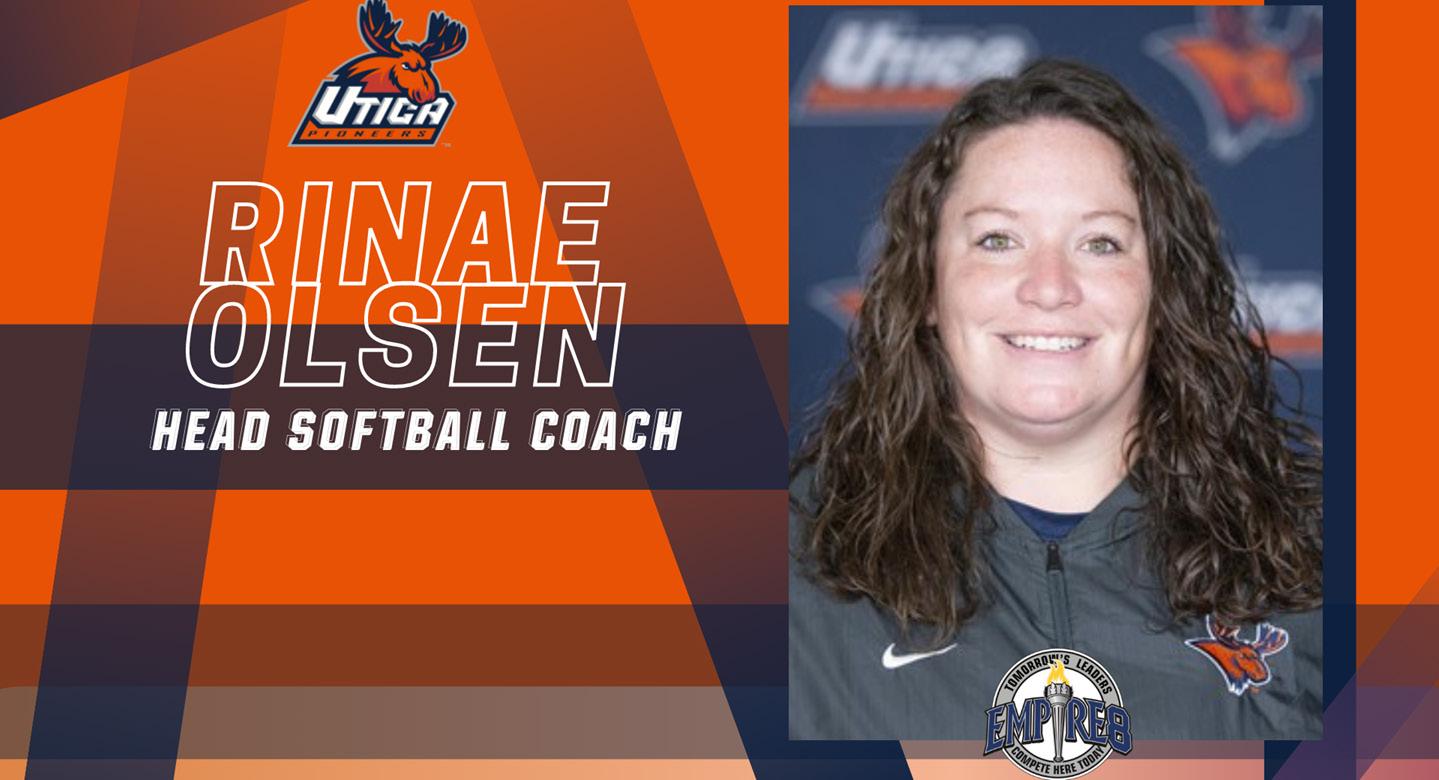
During Olsen’s time as a student, she played 147 games, ranked sixth most in program history and was a main contributor to the 2006 season for the Pioneers. With a 36-11 record, they finished second in the Empire 8 conference and had an ECAC Tournament appearance.
In Utica’s record book, she ranks within the top ten in the total number of RBIs and career fielding percentage.
After her athletic career, she stayed with the Pioneers as an assistant coach for Pat Mineo. Coach Mineo was the head coach of Utica’s softball team for sixteen years. Olsen’s experience as an assistant coach with Utica University and Ithaca College for nine years and the previous three years of experience as a head coach, Olsen was an ideal candidate for the head coach job for the Pioneers. Last year, the softball team for Utica University had a 14-24 record in Mineo’s final season as head coach.
The Tangerine met with Olsen to welcome her back to the Utica community, receive some intel about coaching history, and what she looks to do in her spare time.


Q: How does it feel to be the new head coach for Utica’s softball team?
A: The feeling is great, it is the job I always wanted since I left in 2014 after being an assistant coach for the team. This is home for me and everything I have done since I left Utica I’ve worked my way to get back here.
Q: How was the coaching experience with Ithaca College?
A: My experience was really nice. I started at Utica College for four years as an assistant coach and athletic assistant. At Ithaca, I was a full time assistant coach and it was everything I could have hoped for during that time of my career. Being mentored by Deb Pazzoli who is National Fastpitch Coaches Association Hall of Famer, with a lot of responsibilities I learned a ton of things at Ithaca. This kind of experience brought me to where I am today.
Q: How was your first opportunity as a head coach with Skidmore College?
A: Skidmore was an excellent place to start off as a head coach. I had wonderful student athletes there, the school itself was great. The first year of a head coach was challenging due to the pandemic, being a head coach for the first time it was interesting to navigate because there was no map for that. The second year at Skidmore wasn’t fully back to normal because we were on pause often, only played conference games and didn’t travel down South where we play a portion of our season. Last year, we had a great season from having the most wins in program history and coached an All-American player. I am thankful for my time there but to say I am happy to be back at Utica is an understatement.
Q: What position did you play in softball as an athlete? Talk about your time as a player.
A: I grew up playing catcher and third basewoman. I was recruited to Utica to play but I ended up with a torn labrum in my throwing shoulder. Coach Mineo switched to play at first base and I played almost every game there. I filled in at third base or catching at times, especially on my
senior day I had to catch because of injuries and other reasons. Overall, I loved being involved in every play and transitioning to different positions
Q: With your familiarity of being an athlete, how can you help the players on the Pioneer softball team on and off the field?
A: The big benefit of me coaching and playing at Utica is that I have been in the players’ shoes. At Skidmore College, I couldn’t relate as much, it was a high academic college with a different student body. Going here and seeing all the great changes that were made on campus I can relate to the entire team when it comes to being on the field, different challenges they may face in the classroom or socially.
Q: Do you have any goals for the upcoming season for this team?
A: Yeah, I want to be better as a team and win a lot of games. We are looking to make a name for ourselves again in the Empire 8 conference. Those players on the team are working very hard and the coaching staff is doing a great job of working with players to thrive as a team.
Q: What was your favorite walkup song when coming to the home plate?
A: Dave Fontaine and I
were just talking about this. When I was here as a player, we didn’t have walk up songs. I have heard walk up for the past 15 years. A former player of mine at Ithaca College, her name is Alex Wright, she had the song , X Ambassadors & Jamie N Commons ft. Jay Z - Jungle (Remix). I thought it was an awesome song to walk up to. Assistant Coach Megan White had a pretty nice walk up when she played at Skidmore, it was Dior by Pop Smoke. Dior was my favorite one at the time. Those two songs have to be my favorite two walkup songs I heard.
Q:Outside of softball and coaching, what are some things you like to do in your spare time?
A: My wife and I have a new dog, it’s a rescue dog. Recently, I have spent a lot of time with my dog. I like to travel a lot, going to concerts with my wife and we love going to different live shows. The number one thing I love to do is spending time with my family. My brother is in New Jersey, my sister is in Massachusetts and my parents are back and forth from Utica and Massachusetts. It involves traveling, which I enjoy but whenever we all get together, we make it a priority to have quality time with each other.
PAGE 12 FRIDAY, OCTOBER 21, 2022 UTICATANGERINE.COM SPORTS
Utica University’s new softball coach /Photo: uticapioneers.com





























